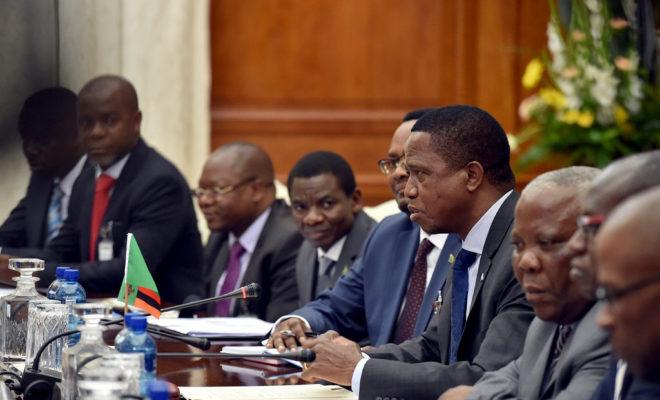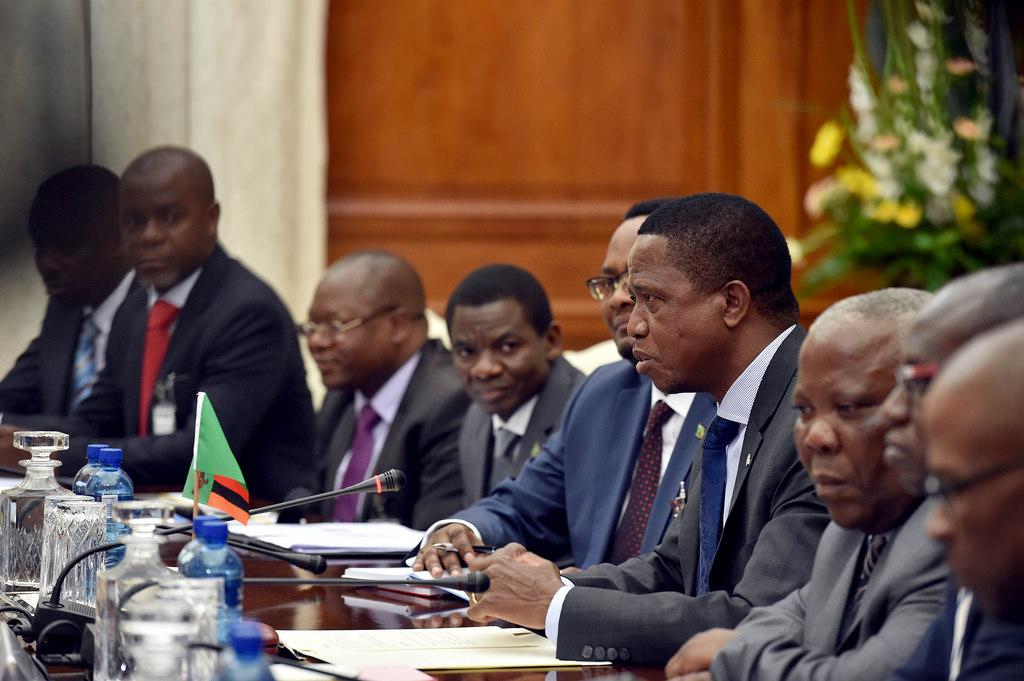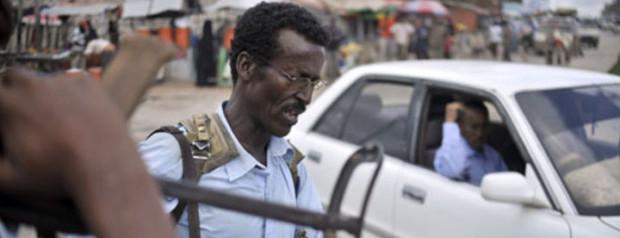Zambia’s authoritarianism deepens, emboldened by IMF support

An opposition leader in jail. 48 MPs suspended. A $1.2 billion IMF package on the way.

President Edgar Lungu is accused of embarking on a campaign against opposition voices across society. Credit: GCIS.
The speaker of Zambia’s National Assembly, Patrick Matibini, has suspended 48 opposition legislators for 30 days as a punishment for unauthorised absence from parliament. Their offence? To have been missing for President Edgar Lungu’s state of the nation address in March.
The suspension of the MPs does not come as a great surprise. Hardliners from the ruling Patriotic Front (PF) have been pushing for something along these lines for some time. The ruling party was quick to try and disassociate itself from the Speaker’s actions. But, as Zambian commentators have pointed out, the action fits into a broader web of measures designed to intimidate those who question the president’s authority.
The most significant was the arrest of opposition leader Hakainde Hichilema, who remains in jail on trumped up treason charges.
[Hichilema: It’s high time to fix Zambia after 5 years of failed leadership]
While the latest development in Zambia’s growing political crisis doesn’t come as a shock, it will disappoint those who were hoping that Lungu would be persuaded to moderate his position. Instead, it appears that the International Monetary Fund’s decision to go ahead with a bail out package despite the government’s democratic failings has emboldened the president to pursue an authoritarian strategy.
As a result, a swift resolution to the current political standoff seems unlikely.
Roots of the crisis
For some time Zambia was considered to be one of the more competitive democracies in Africa. But a period of backsliding under Lungu has raised concerns that the country’s inclusive political culture is under threat. The current impasse stems from the controversial elections in 2016 when Lungu won a narrow victory that remains contested by the opposition United Party for National Development (UPND).
[Zambia’s disputed elections: on claims of binned ballots and “systematic bias”]
[Zambia’s 2016 elections: is a disputed outcome now inevitable?]
Hichilema, the leader of the UPND, has stated that his party will not recognise the legitimacy of Lungu’s victory until its electoral petition against the results is heard in court. The initial petition was rejected by the Constitutional Court. But its decision was made in a way that had all the hallmarks of a whitewash. The UPND subsequently appealed to the High Court. Hichilema’s decision to make his party’s recognition of the president conditional on the petition being heard was designed both as an act of defiance and as a means to prevent the government from simply sweeping electoral complaints under the carpet.
Until the court case is resolved, the opposition is committed to publicly challenging the president’s mandate by doing things like boycotting his addresses to parliament. In response, members of the ruling party have accused the UPND of disrespect and failing to recognise the government’s authority. It is this that appears to lie behind Hichilema’s arrest on treason charges.
Punishing parliamentarians
The suspension of UPND legislators needs to be understood against this increasingly authoritarian backdrop. It is one of a number of steps taken by those aligned to the government that are clearly designed to intimidate people who don’t fall into line. Other strategies include public condemnation of the government’s critics and proposals to break-up the influential Law Society of Zambia.
Efforts by the president’s spokesman to disassociate the regime from the suspensions have been unpersuasive. The official line of the ruling party is that the speaker of parliament is an independent figure and that he made the decision on the basis of the official rules. It’s true that the speaker and parliamentary committee on privileges, absences and support services have the right to reprimand legislators for being absent without permission.
Nonetheless the argument is disingenuous for two reasons. The speaker is known to be close to the ruling party, a fact that prompted Hichilema to call for his resignation earlier this year. And the committee’s decisions are clearly driven by the Patriotic Front, which has more members in it than any other party.
The claim that the suspension was not government-led lacks credibility. This is clear from the fact that Patriotic Front MPs have been the most vocal in calling for action to be taken against the boycotting opposition MPs.
IMF lifeline for Lungu
There are different perspectives on the crisis in Zambia. Some people invoke the country’s history of more open government to argue that Lungu will moderate his position once the government feels that the opposition has been placed on the back foot. Others identify a worrying authoritarian trajectory that began under the presidency of the late Michael Sata. They conclude that things are likely to get worse before they get better.
One of the factors that opposition leaders hoped might persuade President Lungu to release Hichilema and move discussions back from the police cell to the negotiating chamber was the government’s desperate need for an economic bail out. Following a period of bad luck and bad governance, Zambia faces a debt crisis. Without the assistance of international partners, the government is likely to go bankrupt. This would increase public dissatisfaction with the PF and undermine Lungu’s hopes of securing a third term.
But the willingness of the IMF to move towards the completion of a $1.2 billion rescue package suggests that authoritarian backsliding is no barrier to international economic assistance. In turn, IMF support appears to have emboldened the government to continue its efforts to intimidate its opponents.
IMF officials, of course, will point out that they are not supposed to take political conditions into account and that their aim is to create a stronger economy that will benefit all Zambians. This may be true, but the reality is that by saving the Lungu government financially the IMF is also aiding it politically. Whatever its motivation, the agreement will be interpreted by many on the ground as tacit support for the Patriotic Front regime, strengthening Lungu’s increasingly authoritarian position.
This article was originally published on The Conversation. Read the original article.![]()





Why do you “people” think we are still savages in the bush! Do you really believe in your heart that the honourable speaker – a very distinguished judge – would trump up charges of MPs. Really? Like in your countries, we also have laws and rules. If you break them you may be arrested. We have a very upright judicial system which works. Why do you always report us in the negative? For your information, I am not a supporter of the ruling government but I respect the law. For once try to be objective. Believe it or not, we are also human beings! Your writing is one of inciting civil strife. Search your soul.
IMF will give Zambia the money because they have understood and seen that the government did not act maliciously but is following the rule of law. And I can tell you for nothing, having lived in Zambia through all the previous governments, this is the only one I have seen which is trying to do everything by the book. Be fair in your research…… or are you a hired gun?
The biggest problem is that most African political parties are aligned a long tribal or regional grouping hence the problems we face. Some individuals support certain political parties simply because the aspiring candidate is a tribesman even when they know well that he is not the best for the country. To be frank, I consider FP as political party for those who have their origins in Eastern, Luapula, Northern and copper belt province while UPND is for those with route from Sothern, Western and parts of central provinces. Lusaka is a mixed cut. This applies even to sister countries like Angola. UNITA is considered as political party for pipo from south or with routes from there like the Ovimbundus and MPL is for those with origin from North West Angola Kaluandistas. Going by facts Savimbi was the best choice for Angola as president but bcoz of being “sulano” none could adhere to his admonishing words but today majority feels his absence except those that who support a regime like we know.
What’s wrong with these imperialists? I am not a politician, i am not a sympathizer of the current ruling government either but i am sorry your reporting is ridiculously impractical, illogical, irrational, senseless, absurd, silly, harebrained, ludicrous, preposterous and ill-advised. Please note the following:
1. IMF is a credible organisation with highly dedicated and educated individuals who carry out thorough due diligence before approving any facility. They cant offer $1.2 billion package to a country that is unstable politically.
2. The 2016 general elections were monitored by international, regional and local credible organisations and they all declared the 2016 elections free and fair. Who are you to claim otherwise? On what basis are you claiming otherwise?
3. In your report you have rightly put that the initial election petition was rejected by the Constitutional Court, but you haven’t told us the reason why the petition was rejected- don’t mislead people.
4. Zambia is a sovereign state like any other state with its own rules to follow and anyone who breaks the law should be answerable, no one is above the law. Should we tolerate lawlessness in the name of democracy? Is that your definition of democracy? The 48 opposition law makers have been suspended by the speaker because of not following the decorum of the house-nothing wrong with that.
5. Roots of crisis???? Are you serious?- I live in Zambia and i cant see any crisis anywhere.
6. Your reporting is careless and detrimental to the image of the country. Zambia has enjoyed its democracy for over 50 years and your careless reporting can ignite strife, but be assured, Zambians wont allow that. The perception of Africa in the western countries is very wrong (i know because i lived there for many years) and the reason is simple- Wrong Media coverage. You deliberately and systematically destabilize most African countries through huge PR campaigns-making impression that all African countries are autocratic, poor and dying and merely surviving on aid. WRONG!!
Cry my beloved country
If there has been any democrat since the inception of plural politics in Zambia, it is Mr Lungu, the current president of Zambia. He has been insulted left right and centre, in fact provoked beyond any reasonable human can take but he has been steady fast and refused to barge and has been able to accommodate as much opposition view as possible, which is usually very provocative, even within his political party. I think media and many other authors contributing must learn to contribute objectively so that they don’t mislead the masses. God bless Zambia!
Your report is very inacurate. The petition was heard. The constitution demand that the case be conclued within 14 days. In that 14 days the opposition Lawyers presented not a single evidence to support their claid. That is how the case was thrown out. To reopen it our constitution would have to be amended to allow hearing to continue after the stated 14 days.
I can only read negativity and stupidity in your reporting, Zambia is governed by the rule of law and every person stepping on its rich soil should abide to it. Law should act on anyone whether rich or poor, famous or not. Stop supporting what you don’t know, the 48 suspended MPs are nothing but just a bunch of minions who are trying to destabilise our country both economicaly and politicaly. Don’t be a hired Gun for nothing do your research before embarassing yourself.
ONE ZAMBIA ONE NATION ONE PRESIDENT.
Problem is that most of the people reading and commenting are cadres. These are a kind of people who you can not learn from. To them everything is political. I wish a more ordinary Zambian can be reading and maybe learning something current about Africa.
Point on Nic, pay no attention to PF functionaries and cadres crying like babies, playing the imperialist card. They never write anything, these reactionaries. Sometimes I wonder how a whole country has men without b **s. A nation of cowards, and purporting to know God more than Isreal. I carry this passport with shame.
Things are really Bad in Zambia now any opposing voice risk being arrested or beaten by pf cadres in full view of the police who will be watching helpless.
(1)Opposition leader is arrested.
(2) Church mother bodies threatened with arrest for airing their views.
(3)opposition Mps suspended.
(4) Main private owned newspaper closed.
(5)2MPs from ruling party whose elections were nullified by the court are still very active members of the house and the speaker hasn’t done anything.
Let us pray for Zambia.It has been a haven of peace for so many years.
Is Zambia trying to follow in the footsteps of their new and recent discovered friend Paul Kagame of Rwanda?
If we all Rwandans love Paul Kagame 100% why is Rwanda leading in killing,emprisoning,exiling oppositional leaders? What is he afraid of? Why did he need to manipulate the constitution so that he becomes a king of Rwanda?